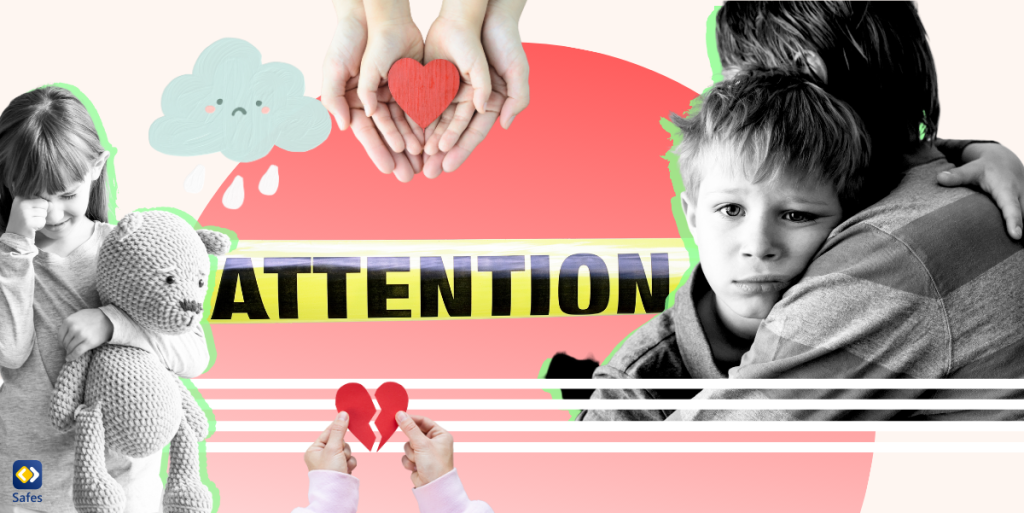Emotionally unavailable parents are parents who are physically present but cannot provide emotional support or express empathy towards their children. This can have a destructive effect on children’s development and well-being and affects children’s future lives negatively.
Download and Start Your Free Trial of the Safes Parental Control App
The negative impacts of emotionally absent parents on children are loss of hope and joy, depression, and selfishness. Some of these impacts are long-term and can cause serious mental health issues in children.
In this blog, we are going to explain the importance of emotional connection in parent-child relationships, symptoms of emotionally unavailable parents and a number of practical tips for parents who recognize their own emotional unavailability.
Recognizing Emotional Unavailability
There are no clear indications to recognize how emotionally unavailable parents behave but the common signs include:
- They have difficulties in expressing their emotions
- They respond to children’s emotions impatiently
- They ignore their children’s basic needs
- They cannot engage in any feelings
As we just mentioned It’s hard to detect emotional unavailability because some parents may show their love and care in other ways. But it is recommended to be attentive to the above-mentioned subtle cues.

Debunking Theories Like Cold Mother Syndrome
While some theories highlight the importance of early relationships in children’s development, the concept of a “Cold Mother can cause psychological disorders” has received a lot of criticism. There is certainly no evidence to prove that dismissive or emotionally absent parents cause developmental disorders in children.
Here are a couple of reasons that show why the concept of “Cold Mother” has faced significant criticism:
Lack of Empirical Evidence
Critics argue that there is not enough empirical evidence to support the idea that a particular parenting style, for example being cold, directly causes specific psychological syndromes or disorders in children.
Cultural and Contextual Differences
Different cultural and environmental contexts have a significant impact on parenting styles and family dynamics around the world. These variations showcase how traditions, cultural norms, and social situations influence how children are raised.
According to some studies, White American families are supportive parents. They have warm communication with their children and set moderate limitations for them. But in contrast, Asian American families’ manner is not too friendly, and they are stricter in their parenting style.
Evolution of Attachment Theory
According to the theory of attachment by John Bowlby, it’s not valid to label mothers “cold” or “warm”. The child’s emotional bond with their caregiver or parents is more important. In other words, he focuses on secure attachments and bonds among children and parents rather than other factors.
Parental Well-Being
It’s crucial to pay attention to the mental health and well-being of parents since they may need support due to the emotional challenges that they faced in the past. In some cases, recognizing the mental issues in parents and curing them can improve parent-child relationships.
Effects of Emotional Unavailable Parents on Children
Being raised by an emotionally distant parent can lead to a life of unstable friendships, low self-esteem, and emotional neediness. Children who have emotionally unavailable parents may unconsciously avoid getting close to anyone because they have a fear of being hurt or abandoned again.
Here are a few of the effects of having an emotionally unavailable parent:
- Difficulty in expressing their emotions
- Difficulty in trusting others
- Weak social skills
- Dealing with mental health issues

Causes and Factors
The emotional unavailability of parents can have various fundamental causes. It’s essential to recognize the causes; they may vary from person to person. Emotional unavailability in parents could be caused by the following factors:
- Childhood experiences: Parents who were raised in an environment where emotions were discouraged may struggle with supporting their children emotionally.
- Mental health issues: If parents are not healthy mentally, they cannot provide emotional support for children
- Lack of awareness: Some parents may not be aware of the importance of emotional support for children.
Strategies for Dealing with Emotional Unavailability
Emotionally unavailability does not have to be permanent. It can be solved by implementing some strategies, although it’s a complex issue that requires proactive strategies to improve it.
When parents are willing to change their manners towards their children or when they understand that children need parents’ support, they can become more available and supportive parents.
You can try these strategies for addressing emotional unavailability:
- Raise your information about parent-child relationship.
- Build your emotional intelligence by identifying your feelings and expressing them.
- Pass more time with your children by doing some hobbies like watching films or playing games.
Parental Self-Care
Parental self-care has a huge impact on children’s development. Parents who put aside time for themselves are healthier mentally, therefore they are more successful in their parenting.
Children who have self-caring parents are more patient, can navigate problems better, and have better communication skills.
The Role of Parental Control App
Emotionally unavailable parents can use the help of parental controls to monitor their children. Because they cannot express their feelings directly, they can utilize parental controls to be more involved in their children’s lives.
Parents can use the default parental controls on their child’s device such as Android parental controls or iPhone parental controls. Setting boundaries and limitations on the usage of devices and social media applications can be done by using Safes. Safes is a parental control app available on iOS and Android, that allows you to:
- Limit screen time
- Instantly block all apps
- Set schedules for individual apps
Experience these features firsthand with our 14-day free trial. Start protecting your child’s digital well-being today, without the need for a credit card.
Conclusion
Overall, we explained how emotionally absent parents affect a child and the causes. Also, we mentioned some tips for parents who are dealing with this issue. The tips are raising awareness, spending more time with children, and doing hobbies together.
Your Child’s Online Safety Starts Here
Every parent today needs a solution to manage screen time and keep their child safe online.
Without the right tools, digital risks and excessive screen time can impact children's well-being. Safes helps parents set healthy boundaries, monitor activity, and protect kids from online dangers—all with an easy-to-use app.
Take control of your child’s digital world. Learn more about Safes or download the app to start your free trial today!




